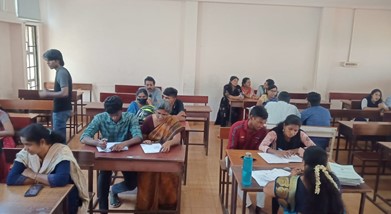Jerusalem College of Engineering in Southern India will Open a Taiwan Education Center

The Education Division at the Taipei Economic and Cultural Center in India, a representative office of Taiwan’s Ministry of Education, signed a memorandum of understanding (MOU) with Jerusalem College of Engineering, an autonomous engineering college in southern India, in a virtual signing ceremony held on the 23rd of May, 2024. The MOU was signed by Peters Chen, Director of the Education Division, and by Dr Ramesh S., the principal of Jerusalem College of Engineering. Richard Chen, the Director General of the Taipei Economic and Cultural Center in Chennai, and representatives of the Education Division and of the college expressed their enthusiasm for the partnership and emphasized the importance of international cooperation in today's interconnected world.
The engineering college will open a Taiwan Education Center on its campus and employ a Taiwanese teacher to teach Mandarin to its students. The Mandarin teacher will also act as a bridge between this engineering college in India and educational institutions in Taiwan and help facilitate communication between them. Furthermore, the Taiwan Education Center will provide students with information about available scholarships and other opportunities to pursue further studies in Taiwan.
The signing of this MOU between the Education Division and Jerusalem College of Engineering underscores the commitment of both to the enhancement of mutual understanding, the strengthening of academic ties, and promoting innovation through joint initiatives. It reflects the growing momentum in bilateral relations between Taiwan and India and the potential for increased collaboration across various sectors, including education, culture, and innovation.
As Taiwan and India deepen their economic ties and interactions, there is a growing demand for individuals who can facilitate cross-cultural understanding Proficiency in Mandarin positions individuals as cultural ambassadors, capable of fostering closer ties and driving meaningful exchanges between Taiwan and India. Moreover, with the influx of Taiwanese companies into India, especially southern India, there is a rising demand for professionals who can speak Mandarin. Job seekers with Mandarin proficiency have a competitive edge in industries where Taiwanese companies have a significant presence, such as manufacturing, electronics, and IT.
Taiwan’s Ministry of Education looks forward to seeing this partnership with Jerusalem College of Engineering and the new Taiwan Education Center create meaningful opportunities for students, researchers, and academics from both India and Taiwan.